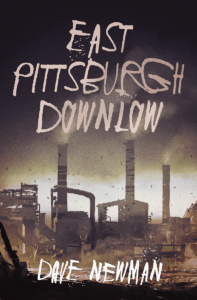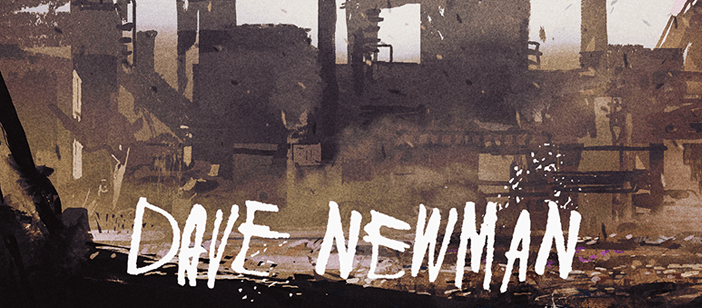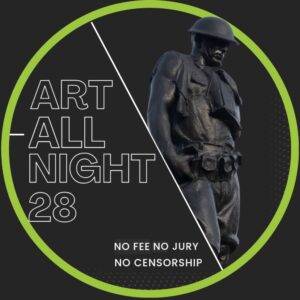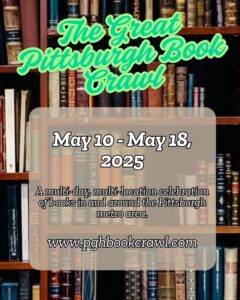From the publisher: “A former welder turned community college professor, Sellick Hart narrates East Pittsburgh Downlow, the story of people who struggle to pay their bills but know they want a better life. The characters are waitresses, UPS employees, and bartenders. They are former professional athletes and drug dealers with dreams. They are students of all ages. Everyone understands that now is the time to make their dreams come true. Every day, the world is a little uglier. Every day, you get paid a little less. Sellick wants to write a literary novel about the people he teaches, students who work full-time while taking classes in Air Conditioning & Heating Repair. Sellick knows about careers. He grew up in dives and trailers, attended university on a wrestling scholarship, and graduated with a useless English degree. He spent years welding on bridges, eventually publishing western novels under the name Montana Jones. East Pittsburgh Downlow is the story of Sellick’s mom who refuses to grow old. It’s the story of Megan, the student that wants to date Sellick. After the class where Megan turns in another brilliant story, Sellick answers a call from his former wrestling coach Lawrence Riggins, the greatest heavyweight collegiate wrestler of all time and a former all-pro guard for the Pittsburgh Steelers. Riggins is five minutes out of jail…”
Don’t miss out: Celebrate the release of Dave Newman’s latest and the re-release of Belief Is Its Own Kind of Truth, Maybe (Autumn House Press), Lori Jakiela’s award-winning memoir on Thursday, November 14th at Brillobox. Readers include Newman, Jakiela, Lou Ickes, Meghan Tutolo, and Adam Matcho!
About the Author: Dave Newman is the author of seven books, including East Pittsburgh Downlow (J. New Books, 2019), the novella Sammy Drinks Canned Beer (White Gorilla Press, forthcoming 2020), The Poem Factory (White Gorilla Press, 2015), the novels Raymond Carver Will Not Raise Our Children (Writers Tribe Books, 2012), Two Small Birds (Writers Tribe Books, 2014), Please Don’t Shoot Anyone Tonight (World Parade, 2010) and the collection The Slaughterhouse Poems (White Gorilla Press, 2013), named one of the best books of the year by L Magazine. His stories, essays, and reviews have appeared in Gulf Stream, Vol. 1 Brooklyn, Belt, the legendary Nerve Cowboy, Smokelong Quarterly, Ambit (U.K.), Tears in the Fence (U.K.), The Pittsburgh Post-Gazette, and many other places. He appeared in the PBS documentary narrated by Rick Sebak about Pittsburgh writers. Winner of numerous awards, including the Andre Dubus Novella Prize, he lives in Trafford, PA, the last town in the Electric Valley, with his wife, the writer Lori Jakiela, and their two children. He works in medical research, serving elders.
WESTERN NOVELS ARE ROMANCE NOVELS FOR MEN
 I never lost the glow of Miss Dee, the high school librarian, not even when I welded bridges, but the desire to write dimmed considerably against the exhaustion of most days and my reading navigated towards books involving dead bodies and the men who killed them and the women who inspired murder.
I never lost the glow of Miss Dee, the high school librarian, not even when I welded bridges, but the desire to write dimmed considerably against the exhaustion of most days and my reading navigated towards books involving dead bodies and the men who killed them and the women who inspired murder.
“Don’t be proud,” Miss Dee had said. “Read at your level and rise up.”
Or go down.
She never mentioned that.
I figured I’d be reading Spanish novels in Spanish by the time I was thirty but instead I learned to love Jim Thompson and James Cain and Agatha Christie, masters of the shoot-‘em-up, the drifter, and the who-done-it.
Around this time I met a woman who wrote romance novels and made her living at it.
We were sort of a couple, sort of not.
I’d gotten herpes from a wrestling mat or an infected wrestler during my senior year of college, three people on our team did, mine was on my arm, my teammates blistered up on their neck and back, respectively. Even though the doctor explained the whole process and how we weren’t contagious unless there was an outbreak and another person could only be exposed and infected by direct contact, in my case by touching my blistered arm, and even though I never had another breakout and still haven’t all these years later, I was buggy about having herpes and it made me feel dirty. Herpes was what you got from getting laid in a truckstop restroom. I was immobilized with fear that I’d give it to someone else, especially a woman I cared about, and so I got weird romantically, meaning I didn’t have much romance in my life.
This was one of those times, romance but not.
I turned twenty-six that summer and Deborah, not Deb or Debbie, Deborah, was twenty-five and drove a big-ass truck and had recently purchased a dive-bombed apartment building in Wilkinsburg, a struggling neighborhood in Pittsburgh, which she planned to remodel and rent out. She made her money—for the truck and the apartment building and everything else—from writing romance novels. “The sun set like a wilting rose over the vase of my heart,” was the opening line to one of her books. Deborah wrote the opposite of how she lived. She lived rough. She kissed rough, holding my head between her hands, though we seldom kissed more than a smooch when sober and stretching out in the same bed made us both nervous.
I didn’t believe her, that someone could make a living by writing anything, least of all romance novels, even though my mom read and loved them. In the corner of our bathroom, when I was growing up, stood a basket with a stack of paperbacks, their covers showing muscular men with flowing hair clutching big-boobed women who looked desperate for love and adventure and maybe a sexy little slap.
Deborah said, “Here, that’s me,” one night back at her apartment.
I looked at the book, the author photo.
I said, “You wrote this?”
“You don’t think I’m smart enough to write a book?”
“Of course I do,” I said, thinking a monkey with a wet pussy could write a romance novel. “You used your real name,” I said.
“Why wouldn’t I?” she said.
I said, “You’re touchy.”
She said, “Everyone scoffs at romance novels. I’m sick of it.”
I said, “There’s a woman with her dress falling off on the cover. Her tits are so big she makes a Barbie doll look proportional.”
“Yeah,” Deborah said, “but she’s falling into the arms of a guy with super-big muscles,” like this somehow made the writing more legitimate.
“I can see that,” I said.
She said, “How much money have you made off your writing?”
I started to count on my fingers then said, “Zero dollars and zero-zero cents,” meaning neither of the two stories I’d published paid anything. One appeared online and the formatting was a mess and I felt embarrassed at how the story looked, let alone read. The other was a semifinalist for the Jane Bowles Prize, meaning it was neither an honorable mention, nor a finalist, but appeared in the same issue as the winners, albeit buried in the middle next to a story they’d accidentally omitted from the previous issue. I liked to think some kid at the University of Delaware, who published the journal, liked the story, though I never heard that, and the acceptance letter was completely impersonal, so the audience I imagined reaching, one student, probably didn’t exist. No money. No love.
“Exactly,” Deborah said. “I’m a professional.”
“That makes me the amateur.”
“Do you want a drink?” she said.
“Yes,” I said. “Need one.”
Deborah and I continued to see each other for months. We were good friends, two writers who barely knew any writers, so we pretended it might be something like love. On weekends, when I wasn’t working, we drank a lot of vodka mixed with various juices because it seemed healthier. We never had sex. We kissed a lot, sometimes passing out mid-kiss then waking to start again. Deborah had gotten divorced the previous summer after three months of marriage. She caught her husband, who’d been her high school boyfriend, banging a stripper in his truck, which was really Deborah’s truck, she’d made all the payments, so she instantly reclaimed her vehicle and dropped papers on her man then sold the truck and used the money as a down payment on her fixer-upper apartment complex. Then she wrote another novel and bought a better truck, one with a hitch to tow a trailer. At some point during these desperate times she found Jesus without reading the Bible or going to church and decided she would become celibate until she married again, which she never planned to do. Drunk, I could kiss her tits but nothing below the waist. She was free with the handjobs so I was fine with it, the kissing and boozing and sometimes drunken touching, relieved even, keeping my herpes shame to myself while learning how to make money off writing books. Once I asked her why handjobs never appeared in her books, why intimacy was always smoky rough coitus with relentless eye contact. She said, “Handjobs aren’t romantic,” and scrunched up her face like everyone knew that handjobs weren’t romantic, though that’s all we did, drunken tugging. I nodded her off, like sure, absolutely, completely obvious, but I felt bad and a little ashamed and maybe clownish but not enough to decline the next drunken jerkjob
Deborah wrote every day. She finished another romance novel while we pretended to date. She’d been writing two books a year for almost four years.
I couldn’t stop with the questions.
“Who reads these?” I said.
“Mostly old ladies.”
“Where do they buy them?”
“They join a book club and a new paperback arrives in the mail every week.”
“Are they all set in olden times on strange islands?”
Deborah said, “Most of them but the publisher wants to reach younger women too. They’re starting an imprint called Pink Dress. Once I finish the series I’m working on now, I get to write a book for Pink Dress.”
I said, “What’s the difference?”
“Pink Dress books are contemporary.”
“Contemporary women don’t like to get slapped around by muscle dudes.”
“It’s all fantasy, you dumbass.”
Deborah was a fantasy. Dudes who watched home remodeling shows would have loved to bang her because she looked hot in a tool belt without trying to look hot, while being insulted by the notion of hotness. “Don’t look at my ass,” she said every time she climbed a ladder.
I said, “So Pink Dress books are set on modern islands and the chicks wear bikinis instead of long flowing dresses with their bosoms popping out?”
“No,” she said. “Pink Dress books are supposed to be stories about working women who end up finding romance. There are all kinds of rules.”
“They give you rules?” I said.
“Of course they give you rules,” she said. “You really don’t know anything about professional writing, do you?”
“Nothing,” I said. “I know more about professional wrestling.”
I dropped an elbow on her, so we fell deeper into the couch.
The couch was a thing from Goodwill she’d bought for twenty bucks and reupholstered. It looked like a tweed coat from a Norman Rockwell photo.
“Off me, you lug,” she said.
She was tiny but wore shit-kicking boots.
I moved before she could respond.
I hated when she kicked.
She said, “They gave me three-page plot outlines I needed to follow for my first couple books until I proved myself.”
“Now you just get rules?”
“Yes.”
“Like what?”
“Like all the books have to be set in New York or Los Angeles. This is for the Pink Dress imprint, what I’m talking about. All the food has to be fancy and the wines fine, even if the main character is just learning about food and wine. The main character has to have an interest in shopping for something, diamonds or shoes or whatever. The rules are basic. Fancy purse, love, shoes, fears about snacking. It’s just stuff other women can relate to.”
“What about the men?”
“They read westerns.”
“No one reads westerns anymore.”
“Old men do,” she said. “Millions of old men.”
“No kidding,” I said, finishing my drink, thinking of Louis L’Amour.
I pictured millions of old men and the paperbacks they read and it was like building a city in my mind, a fortress of paper bricks, rows of mass-market skyscrapers where the craftsmen get paid for their contributions to the buildings.
“Uh oh,” she said. “Someone looks like he’s thinking about selling his soul.”
I poured another drink, a vodka kiwi.
I said, “It’s hard being on bridges.”
I said, “I tried to grow a beard one winter and the sparks from the welding gun burned away chunks of the hair.”
I said, “It’s so bright up in the sky.”
I said, “I’m scared of falling.”
I stopped but I didn’t need to.
Deborah said, “Let me see what I can do.”
I toasted her with my vodka kiwi.
The next day she contacted her editor who contacted an editor who contacted another editor in the department that published what they called adventure books, all action stuff geared towards men of a certain age, old guys who hated TV because of the profanity. The editor was a woman. All the editors —romance, mysteries, Pink Dress, westerns, crossword puzzles – were women. One of their husbands owned the company, I think. It was all secretive. The woman editor sent me an outline and a contract. Five grand upon completion plus royalties. No longer than two-hundred pages in manuscript. Next book due within six months. The company owned everything, story, title, film rights, world rights, even my characters’ names. Terrible deal, absolutely horrible. I immediately signed the contract. I sat down at Deborah’s computer with a bottle of vodka, a bowl of ice, and a six-pack of pineapple juice. I poured a drink and typed, “He didn’t think of himself as a real cowboy, but his father owned the Bullet Hole Ranch out west in Wyoming,” and finished the novel three days later, still drunk, my main character riding south to Mexico on a palomino with the woman he’d always loved.
“Not bad,” the editor said.
“Thanks,” I said, meaning the check, not the compliment.
“The least you can do is have the balls to use your own name,” Deborah said.
“Montana Jones,” I said. “It’s my nom de fucking plume.”
This excerpt of East Pittsburgh Downlow is published here courtesy of the author and should not be reproduced without permission.

























